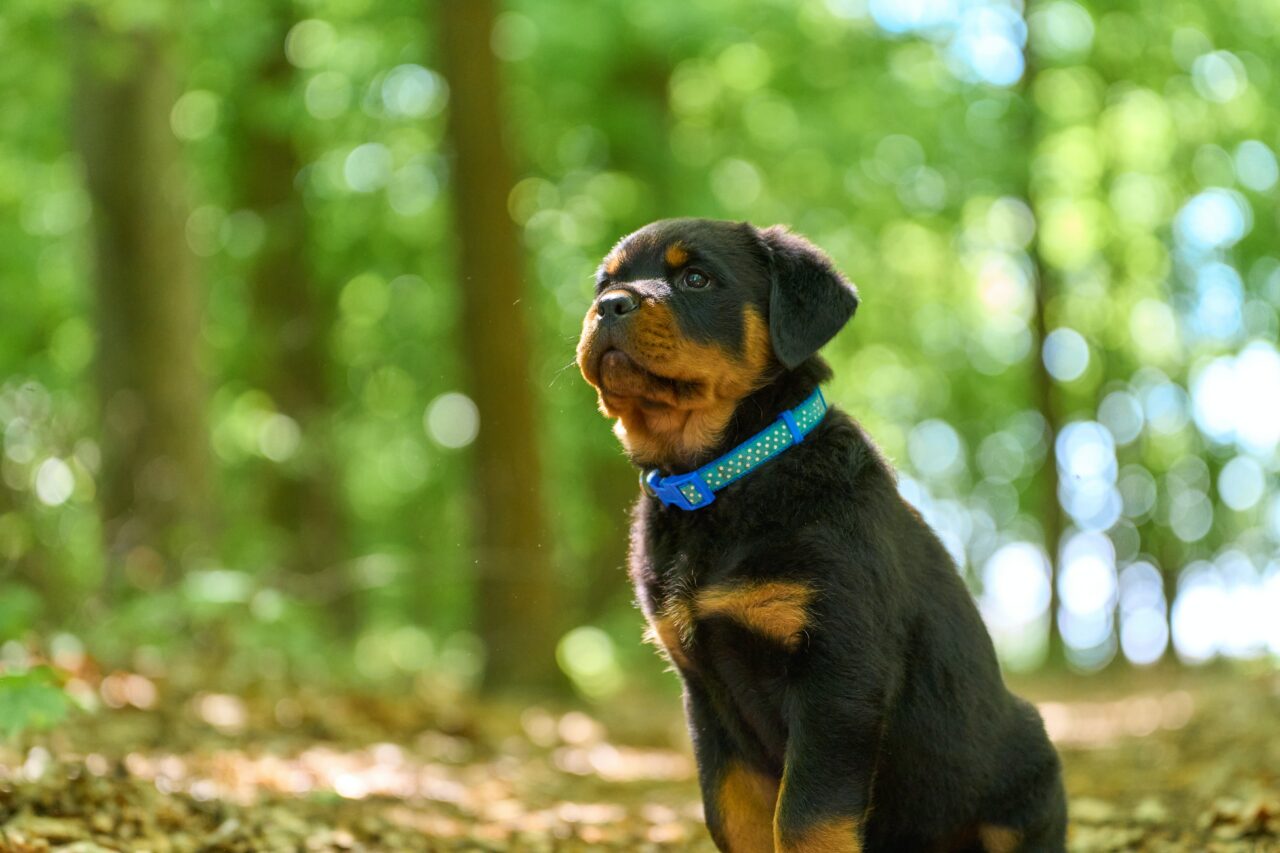Bringing home a Rottweiler puppy is an exciting and fulfilling experience. These loyal and intelligent dogs require proper care and attention to grow into well-rounded and healthy adults. This comprehensive guide aims to provide you with valuable insights and practical tips for raising and caring for Rottweiler puppies and adult dogs. Whether you are a first-time Rottweiler owner or looking to enhance your knowledge, this guide will equip you with the essential information to ensure a happy and harmonious life with your Rottweiler companion.
You may also want to read about labrador puppies.
Bringing Home a Rottweiler Puppy
The first step in the Rottweiler care journey begins with bringing home a new puppy. This section will cover important considerations such as preparing your home, setting up a safe and comfortable space, choosing the right supplies, and introducing your puppy to their new environment. Creating a welcoming and nurturing environment from the start sets the foundation for a strong bond between you and your Rottweiler.
Raising a Rottweiler Puppy
Rottweiler puppies require consistent training, socialization, and structure to become well-behaved and balanced adults. This section will delve into the key aspects of puppy raising, including establishing a daily routine, crate training, housebreaking, basic obedience training, and positive reinforcement techniques. Properly raising your Rottweiler puppy will help them develop good manners, confidence, and a positive attitude towards learning.

Socialization and Training
Socialization is crucial for Rottweilers to grow up as friendly, confident, and well-adjusted dogs. In this section, we will explore the importance of early socialization, exposing your Rottweiler puppy to various environments, people, animals, and different situations. Additionally, we’ll discuss the significance of ongoing training, advanced obedience commands, and specialized training activities to keep your Rottweiler mentally stimulated and engaged.
Feeding and Nutrition
Providing a balanced and nutritious diet is vital for the overall health and well-being of your Rottweiler. This section will outline the dietary needs of Rottweiler puppies, including choosing high-quality puppy food, establishing a feeding schedule, portion control, and addressing common dietary concerns such as allergies and sensitivities.
Exercise and Physical Health
Regular exercise is essential for the physical and mental well-being of your Rottweiler. In this section, we will discuss the exercise requirements of Rottweiler puppies and adults, including daily walks, interactive playtime, and engaging in activities that stimulate both their body and mind. We will also explore the importance of maintaining a healthy weight to prevent obesity-related health issues and the potential benefits of engaging in activities like agility training or obedience competitions.
Grooming and Coat Care
Proper grooming is necessary to keep your Rottweiler’s coat healthy and free from mats and tangles. In this section, we will cover grooming routines, including brushing their coat, cleaning their ears, trimming their nails, and maintaining dental hygiene. We will also discuss the specific needs of Rottweiler puppies versus adult dogs and provide tips on how to make grooming a positive and stress-free experience for both you and your Rottweiler.

Health and Veterinary Care
Regular veterinary care is crucial for maintaining your Rottweiler’s overall health and preventing potential health issues. In this section, we will explore the importance of vaccinations, routine check-ups, and preventive measures such as flea and tick control. We will also discuss common health concerns in Rottweilers, including hip dysplasia, heart conditions, and eye problems, and provide guidance on how to monitor your dog’s health and when to seek veterinary attention.
Behavioral Challenges and Solutions
Every dog, including Rottweilers, may face behavioral challenges at some point. This section will address common behavioral issues, such as separation anxiety, excessive barking, and leash pulling, and provide practical solutions and training techniques to address and overcome these challenges. Understanding the underlying causes of these behaviors and implementing positive reinforcement training methods will help foster a well-behaved and balanced Rottweiler.
Transitioning to Adult Care
As your Rottweiler grows and matures, their care needs will evolve. This section will guide you through the transition from puppyhood to adulthood, including adjusting their diet, exercise routines, and training expectations. We will discuss the importance of continued socialization, mental stimulation, and ongoing training to ensure a smooth transition and set the stage for a fulfilling adult life with your Rottweiler.
Adult Rottweiler Care
Once your Rottweiler reaches adulthood, their care requirements may shift slightly. This section will cover important aspects of adult Rottweiler care, such as maintaining a balanced diet, monitoring their weight, providing regular exercise, and addressing the specific needs of adult dogs. We will also discuss the importance of regular veterinary check-ups, including dental care, and how to support their overall well-being as they age.

Mental Stimulation and Enrichment
Rottweilers are intelligent dogs that thrive on mental stimulation and enrichment. This section will explore various activities and games to engage your Rottweiler’s mind and prevent boredom. We will discuss puzzle toys, interactive feeding methods, scent training, and other mental exercises that can keep your Rottweiler happy, stimulated, and mentally sharp.
Maintaining a Safe Environment
Creating a safe environment is essential for the well-being of your Rottweiler. In this section, we will provide guidance on how to dog-proof your home, secure fencing and outdoor areas, and identify potential hazards that could harm your Rottweiler. We will also touch upon the importance of providing a comfortable and designated resting space for your dog and establishing boundaries to promote their safety and security.
Conclusion
Caring for a Rottweiler puppy and adult dog requires commitment, patience, and a deep understanding of their needs. By following the guidelines and tips outlined in this care guide, you can ensure that your Rottweiler receives the best possible care throughout their life. Remember to provide them with love, attention, and consistent training to foster a strong bond and promote their well-being.
In addition to the information shared in this guide, it’s crucial to consult with a qualified veterinarian and seek professional advice tailored to your Rottweiler’s specific needs. They can provide personalized recommendations regarding diet, vaccinations, health screenings, and any concerns you may have.
Now that you have a solid understanding of Rottweiler puppy and adult care, you are well-equipped to embark on this rewarding journey with your furry companion. With proper care, training, and love, your Rottweiler will flourish into a well-behaved, happy, and healthy member of your family.
FAQs: Rottweiler Puppy and Adult Care Guide
- How often should I feed my Rottweiler puppy? It’s recommended to feed Rottweiler puppies three to four times a day until they are about six months old. Afterward, you can transition them to two meals a day to support their growth and development.
- What are some common health issues in adult Rottweilers? Adult Rottweilers may be prone to conditions such as hip and elbow dysplasia, heart problems, and certain types of cancer. Regular veterinary check-ups and maintaining a healthy lifestyle can help monitor and manage these potential health concerns.
- How much exercise does a Rottweiler need daily? Rottweilers are energetic dogs that require regular exercise. Aim for at least one hour of physical activity each day, which can include walks, playtime, and interactive games to keep them mentally stimulated.
- What is the average lifespan of a Rottweiler? The average lifespan of a Rottweiler is typically between 8 to 10 years. However, with proper care, a healthy diet, regular exercise, and routine veterinary check-ups, some Rottweilers can live beyond 10 years.
- Can Rottweilers be good family pets? Yes, Rottweilers can be excellent family pets. They are known for their loyalty, protective nature, and affectionate demeanor towards their family members. Early socialization and proper training are crucial to ensure they are well-mannered and gentle around children and other pets.
Remember, every Rottweiler is unique, and their individual needs may vary. Pay attention to their behavior, provide mental and physical stimulation, and shower them with love and care to create a fulfilling life for both you and your Rottweiler companion.
